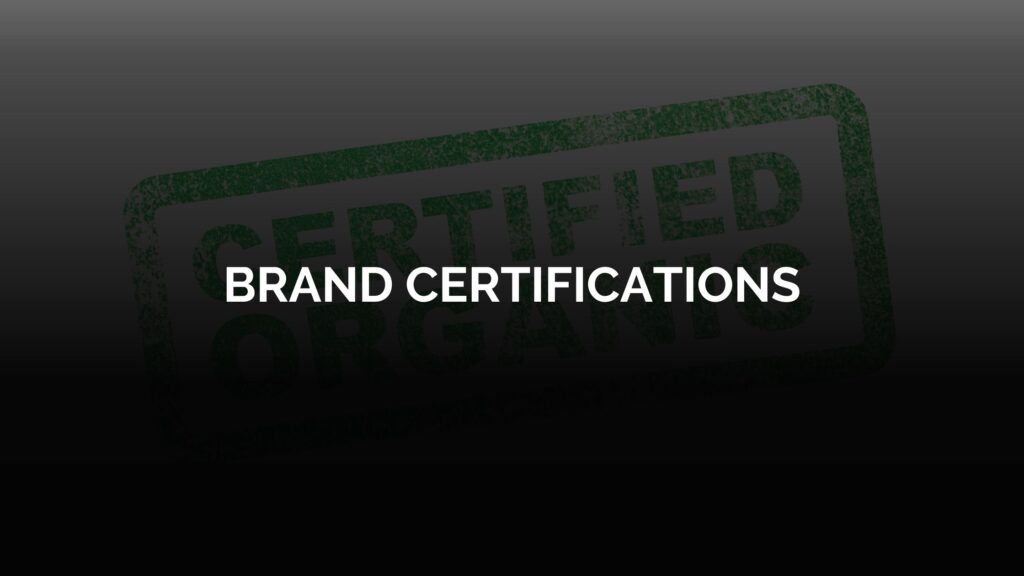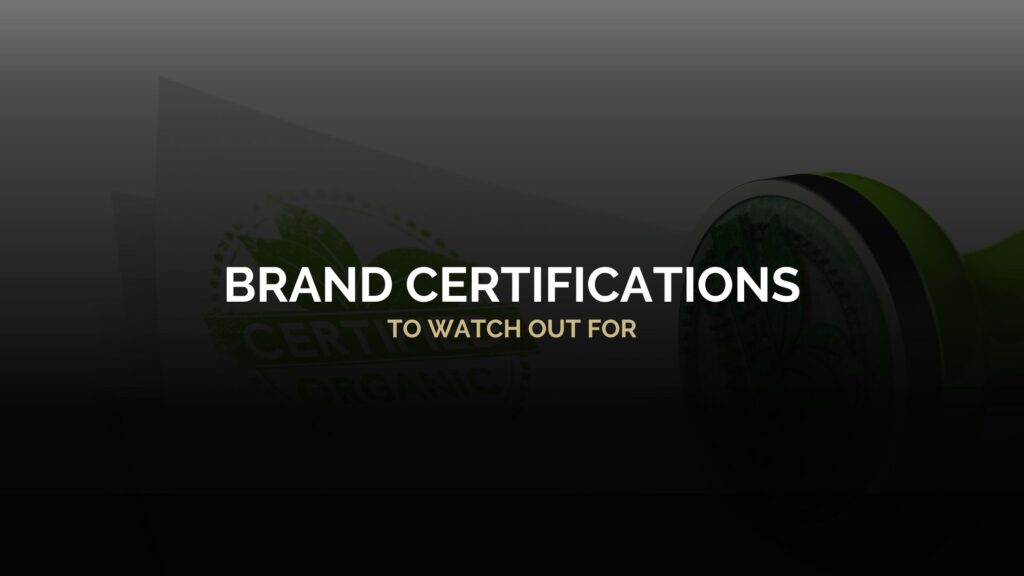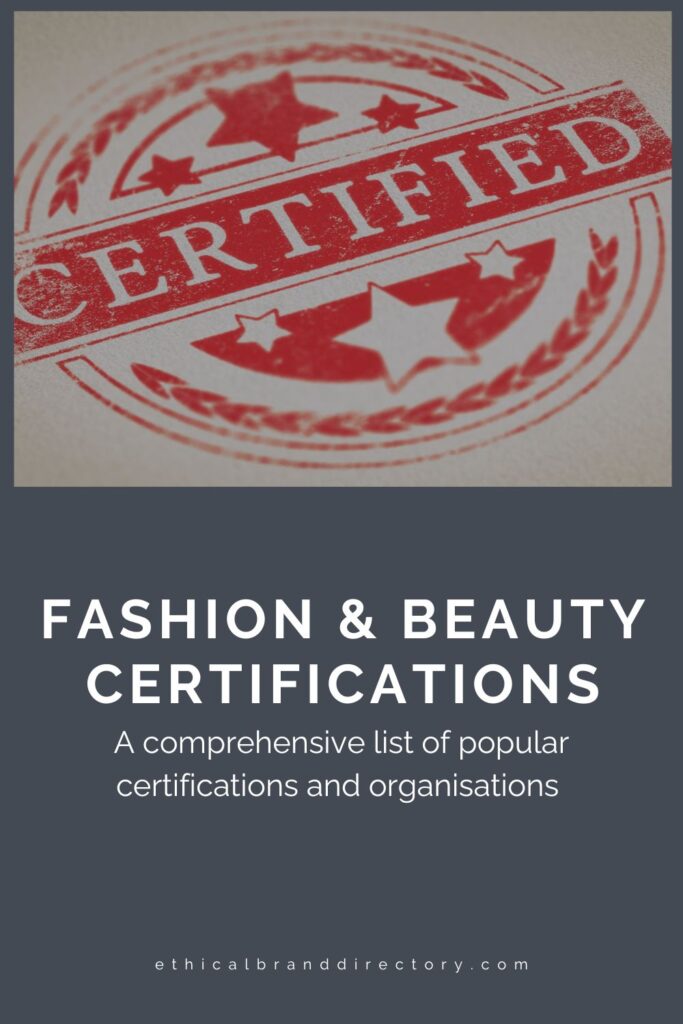Do fashion and beauty certifications confuse you? Are you overwhelmed by all the certifications and logos that you see all over a brand’s marketing?
We’ve compiled a comprehensive list of popular certifications and organisations to look for when researching ethical fashion and beauty. We do not endorse any particular certification over another. These are compiled in no particular order.
We will continue to update this list with more certifications and professional memberships in due course. If we have missed any please add them to the comments below,
Popular certification in fashion and beauty

If you’ve ever wondered what the certifications, stamps and badges you see on brands’ websites mean, take a look through our list to find out more!
B Corporation (B Corp) Membership:
B Corp certification is awarded to companies that meet high standards of social and environmental performance, accountability, and transparency.
Bluesign® Certification
Bluesign® Certification ensures that textiles are produced in the most environmentally friendly and safe manner possible, focusing on resource productivity, consumer safety, water emission, air emission, and occupational health and safety.
Fair Trade Certified:
Fair Trade certification ensures that products are sourced and produced ethically, with fair wages and working conditions for farmers and workers.
Ethical Trading Initiative (ETI) Membership:
ETI works to improve working conditions and labour rights in global supply chains. Membership indicates a commitment to ethical trade practices.
Global Organic Textile Standard (GOTS):
GOTS-certified textiles made from organic fibres, ensuring environmental and social criteria are met throughout the production process.
OEKO-TEX Standard 100 Certified:
This certification ensures that textile products are free from harmful substances and chemicals, promoting consumer safety and environmental protection.
Cradle to Cradle Certified:
Cradle to Cradle certification evaluates products based on their environmental and social impact throughout their lifecycle, encouraging sustainable design and production.
Forest Stewardship Council (FSC) Certification:
FSC certification verifies that wood and wood-based products come from responsibly managed forests, promoting biodiversity and community engagement.
Leaping Bunny Certification:
Leaping Bunny certification verifies that beauty and personal care products are cruelty-free and not tested on animals.
The Vegan Society’s Vegan Trademark:
The Vegan Society trademark certifies products that do not contain animal ingredients and are not tested on animals. This is particularly important for beauty brands and fashion items like shoes and bags marketed as vegan.
Rainforest Alliance Certified:
This certification ensures that products come from farms that meet rigorous standards for sustainability, including environmental conservation and worker welfare.
Carbon Trust Certification:
Carbon Trust certification verifies that companies have measured, reduced, and offset their carbon emissions, demonstrating a commitment to fighting climate change.
1% for the Planet Membership:
Membership in 1% for the Planet indicates a commitment to donate at least 1% of annual sales to environmental causes.
Social Enterprise UK Membership:
Membership in Social Enterprise UK signifies that a business operates for social or environmental purposes, with profits reinvested for positive impact.
Fair Wear Foundation (FWF) Membership:
FWF works to improve labour conditions in the garment industry, and membership indicates a commitment to ethical sourcing and production.
SA8000
Standard: SA8000 is a social accountability standard that certifies companies for fair treatment of workers, including safe working conditions and fair wages. This demonstrates a commitment to ethical working conditions. Brands will state if the suppliers and factories they work with are SA8000 compliant.
ISO 14001 Certification:
ISO 14001 specifies the requirements for an effective environmental management system (EMS). This demonstrates a commitment to minimising environmental impact. Brands will state if the suppliers and factories they work with are ISO 14001 compliant.
Sedex (Supplier Ethical Data Exchange):
Sedex is a platform for sharing ethical supply chain data, and membership demonstrates a commitment to transparency and accountability. Brands will state if the suppliers and factories they work with are Sedex-approved.
Certifications and memberships used by our brands
These are just a few examples of certifications and memberships that can add legitimacy to a brand’s claims. Each certification or membership has its specific criteria and requirements, so brands need to provide proof of their eligibility to be able to use the badge logo on their website and marketing.

FAST TRACK YOUR BRAND
Get the 12 steps to becoming an awesome ethical brand
6 Week Challenge
We respect your information and comply with GDPR.
Brands, certifications and transparency at Ethical Brand Directory
At Ethical Brand Directory we take into account if a brand has done the work to achieve these certifications, and our unique scoring system factors this in.
The perceived significance or prestige of the certification or membership varies from country to country. The effort required for approval is based on the complexity of the application process, the level of documentation and evidence required, and any associated costs or fees.
Should all fashion and beauty brands have third-party certifications?
Keep in mind that the costs for brands to have multiple certifications and membership depend on their specific circumstances and financial resources.
A lot of certifications require a high level of admin and time to proceed with the application, and for small brands time = money. Many certifications cost too much for small start-up brands so their sustainability and supplier transparency pages must provide the necessary evidence.
There are many brands listed on the Ethical Brand Directory, that are family-run businesses or solopreneurs doing a lot of the product design, development and day-to-day business operations themselves. They are unable to afford these certifications and memberships and lack the necessary resources to obtain these third-party accreditations.
This is why we recommend that our brands use the UN Sustainable Development Goals framework, it’s free and can also be used to promote accountability and transparency when it’s used to generate simple progress reports.
Are certifications in the fashion and beauty industry trustworthy?
Unfortunately, as with all organisations and processes, there is room for error, oversight and bias. Some certifications have faced scrutiny over their rating and ranking practices. Overall though they do offer levels of accountability, and traceability and have policies in place – which is better than having entirely unregulated systems in place.
Fashion and beauty certifications and organisations that have faced scrutiny

Fair Trade Certifications:
While Fair Trade Certification aims to ensure fair wages and working conditions for farmers and workers, critics have raised concerns about the effectiveness of the certification system in delivering tangible benefits to producers. Some argue that certification fees and administrative costs can be burdensome for small-scale producers, and there have been cases of non-compliance with Fair Trade standards by certified companies.
Better Cotton Initiative (BCI):
The Better Cotton Initiative (BCI) has faced significant criticism due to its ties with Xinjiang, China, a region implicated in forced labour practices. Despite pledging to cease licensing cotton from Xinjiang, inconsistent enforcement has led to concerns that cotton linked to forced labour may still enter global markets under the BCI label.
Additionally, the BCI’s standards have been criticised for being insufficiently rigorous, potentially allowing minimal improvements to qualify for certification. This has led to accusations of “greenwashing,” where the BCI certification is seen as more of a marketing tool rather than a true indicator of sustainable practices.
Organic Certifications:
Organic certifications have faced criticism regarding the integrity of organic labelling and certification standards. Some critics argue that loopholes in certification standards allow for the use of synthetic inputs and other practices that may not align with consumer expectations of organic farming. Additionally, there have been cases of fraudulent organic labelling and misrepresentation of organic products.
Carbon Offset Programs:
Carbon offset programs, including certifications such as Carbon Neutral Certification, have faced scrutiny over the effectiveness of carbon offset projects in mitigating climate change. Critics argue that some offset projects may not deliver the promised emissions reductions or may have negative social and environmental impacts, such as displacement of communities or loss of biodiversity.
Tree planting:
This is also often scrutinised as there is no guarantee that the trees planted will survive and they will need to reach maturity to be effective at removing carbon dioxide from the air. Not to mention the other challenges with tree planting programmes associated with large-scale carbon offset programmes. Planting trees and offsetting carbon, does not deal with the primary source of the pollution caused by a business, deferring the problem to the future.
Animal Welfare Certifications:
Certifications related to animal welfare, such as cruelty-free certifications, have faced scrutiny over the rigour of their standards and the enforcement of those standards. Some critics argue that certification criteria may not adequately address all aspects of animal welfare, and there have been cases of companies falsely claiming to be cruelty-free or misusing certification logos.

The importance of certifications, memberships and transparency for fashion and beauty brands
It’s important for consumers and all stakeholders to critically evaluate the credibility and transparency of certification programs and organisations. However, it can be overwhelming and sometimes misleading and we must consider additional factors beyond certification status when assessing the ethical and sustainability performance of smaller brands.
Independent verification, transparency in reporting, and ongoing monitoring and evaluation are key elements in ensuring the integrity of certification programs.
At Ethical Brand Directory we applaud total transparency.
We actively encourage our brands to own their journey and be honest about areas for improvement, any oversights or to share key learnings, whilst making clear commitments and setting goals to implement new learnings and changes.
No brand is 100% perfect and we must support and encourage brands to make positive changes rather than faulting them for everything they are doing ‘wrong’ or not doing ‘yet’. We believe in a positive and inclusive approach that looks at each brand’s core values and what they offer, why they do what they do and the positive impact they hope to make.
We’d love to know if you’re swayed by certifications and memberships. Are you open to supporting smaller brands and paying a premium if they have relevant or well-known certifications in place or membership to specific organisations?
For brands that don’t have certifications, does our EBD scoring system help you when you’re trying to ascertain if a brand is truly making a difference?
Let us know in the comments!
The EBD Team
